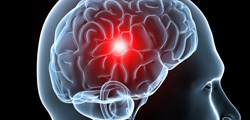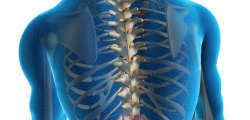Stroke (CVA) Rehab
A stroke is when the blood supply to part of the brain is blocked usually due to a blood clot (emboli) or a bleed in the brain (haemorrhage). Lack of oxygen to the part of the brain supplied by that vessel results in brain damage.
Strokes can affect people in different ways. No two people have exactly the same set of problems. The problems they present with are directly related to the area of the brain that has been damaged by the stroke. Symptoms can be mild and the person may have been managed medically in the community by their G.P. Other people with more moderate or severe symptoms will have been admitted into hospital and undergone rehabilitation for 3 - 6 months.
Neurological physiotherapy can help people with all levels of stroke. Higher functioning patients can be helped to achieve full function again and realistic goals can be worked towards for more moderate or severe problems.
It is a great myth that you will only get recovery within the brain in the first 6 months following a stroke. Research is now available confirming that the brain is a more flexible structure than first thought. This means that the brain will try to make new connections, around the area of damage, in order to reconnect with your muscles and joints. This will restore function and means movements can be re- learnt. Recovery of movement is possibly quicker in the first 6 months but in my experience it can continue for several years following the initial stroke. I have knowledge of some clients just beginning to walk at 1 year post stroke.
With the endless pressures within the NHS the level of treatment a person receives when discharged from hospital is ever decreasing. Often there is a gap before Community Neurological Rehabilitation Teams begin treatment at home. The team will usually offer treatment for approximately 3 - 4 months. Many clients are told they have 'plateaued' towards the end of this time period. Sometimes this may not be accurate, it can be that progress is still occurring but at a much slower rate. It is advisable to continue neurological physiotherapy for as long as recovery is taking place in order to steer the re-building of new pathways in the right direction.
Several factors affect how much recovery occurs and for how long:
- The severity of the initial stroke.
- The time elapsed since the initial stroke.
- How determined and motivated the person is.
- Compliance with any home exercise programme that is set.
- The amount of help and support they are given from their family or carers.
It is important to realise that stroke can be a potentially deteriorating condition. If the person is unable to move effectively themselves, joints can get stiff and muscles can tighten. It is therefore important to maintain what function they have already achieved. This can be done either through a home exercise programme that is reviewed at intervals, or more regular physiotherapy sessions if they are unable to complete exercises independently.
Your neurological physiotherapy session will be tailored to your individual needs. Whether you require a short course of treatment to bridge the gap between hospital discharge and community services, or you require regular rehabilitation, or maintenance. Your needs will be discussed at the assessment and catered for.
An essential part of a neurological physiotherapist's role is not only physical but to understand the psychological impact that the Stroke has left. I am there to support and encourage the person while ensuring that they do not lose sight of their goals.
To contact us for an appointment or regarding any queries please call 07816 768456 or email info@dawnburrow-neurologicalphysiotherapyservice.co.uk



Services
What we treat
- Stroke (CVA)
- Spinal Cord Injury (SCI)
- Parkinson’s disease (PD)
- Multiple Sclerosis (MS)
- Traumatic Brain Injury (TBI)
- Vestibular Problems
- Balance Problems
- Bell’s Palsy
- Elderly rehabilitation and falls prevention
Areas we cover
We cover the following locations:Witney, Carterton, Bampton, Curbridge, Ducklington, North Leigh, South Leigh, Clanfield, Burford, Kidlington, Woodstock, Standlake, Long Hanborough, Bladon, Hailey, Leafield, Finstock, Stonesfield, Shipton under Wychwood, Eynsham, Cassington, Farmoor, Cumnor, Shilton, Minster Lovell, Charlbury, Freeland, OX28, OX29, OX18
Please contact us to find out if we cover your area.




